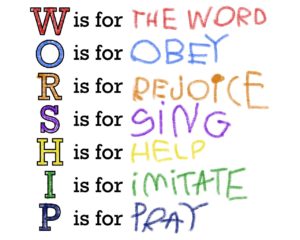My Father was in worship ministry for almost 45 years which gave me the honor and benefit of living and breathing worship, as well as seeing what a lifestyle of worship should look like within the believer, the home, and the church. So, “let’s start at the very beginning…a very good place to start.” (“You’re welcome” to all of you Sound of Music fans out there!) Let’s quickly define worship and then we’ll dig a bit deeper. In his book “Real Worship,” Warren Wiersbe has one of the most concise and clearest definitions of worship when he says, “Worship is the believer’s response of all that he is–mind, emotions, will, and body–to all that God is and says and does.” This is what worship is really about. It’s much more than music or a song, although these are important gifts and tools given to express our love and worship. Worship is a day-to-day lifestyle of pouring ourselves out like an offering to the glory of God (See Romans 12:1).
It seems like in the culture of today’s Christian church, “music” and “worship” are words that are easily interchanged for the same meaning. This is not true! While art forms are powerful tools for conveying adoration and praise, the real meaning of worship is much deeper than a melody in a song.
The grand response of worship, or what I like the call the “divine dialogue of worship,” is something God desires from everyone. Because of this, the church of God, and more specifically the families of God, must be about teaching and passing on the faith to all generations. We must understand what Psalms 127:3-5 says, “Children are a heritage from the Lord, offspring a reward from him. Like arrows in the hands of a warrior are children born in one’s youth. Blessed is the man whose quiver is full of them.” This visual example of an arrow is a powerful one.
An arrow has a purpose but it cannot achieve its purpose if it’s left alone as a mere stick. It must be sanded, sharpened, straightened, and yes, even broken to be able to fly and succeed in its mission. The same is true with discipling future worshippers.
Personally, I have experienced how the strong training and strategic biblical focus in the home can set a course for a life of worship. My father and mother had a powerful routine with their seven children of daily devotions, schooling in the scriptures, music and singing practices, character and discipline training, all combined with weekly service activities inside and outside the church. Although each one of us, like every single person, had to make a personal profession of faith in Christ Jesus, this guidance and coaching helped propel us to who we are today as worshippers and servants of the gospel. For when a family focuses on discipling true worship in the home, they are investing not only in their immediate family, but also the church and its mission as they send out carefully crafted arrows to reach the world for Jesus Christ.
So briefly, let’s spell out the word “WORSHIP” and use it as an acrostic to give us a framework to understand what true worship is from a biblical perspective.
W stands for the WORD
If we believe that worship begins with God revealing Himself to us, then we must begin this study where He reveals Himself the most, the Word. It’s the the place where He chooses to share with us who He is, what He’s done, and what He is going to do. Here is where we find the greatest resource for training hearts, minds, souls, and spirits in worship (2 Timothy 3:16-17).
A Bible that stays on a bookshelf is similar to food that stays in the pantry or medicine that stays in the cabinet. Of course, the Word will never spoil or expire, but like these examples, we will not be using it for its intended purpose, nor will it help restore and give us strength. Every time we open this precious book, we are in a posture of worship because we are literally entering into a wonderful and divine dialogue. Therefore, when we love God, we will cherish, read, and study His Word.
O stands for OBEY
A lifestyle of worship is a lifestyle of obedience. As Jesus said in John 14:15, “If you love me, you’ll obey my commandments.”. Jesus is saying that the primary way to show love and adoration to Him is not by singing a song, but by living with obedience to all He commands. We are commanded to obey God in Exodus 19:5 and Deuteronomy 11:1, the Word of God in Luke 11:28 and James 1:25, Jesus’s teachings in John 14:15 and 2 Corinthians 10:5, our parents in Proverbs 6:20 and Ephesians 6:1-3, and all other authority in Mark 12:17 and Hebrews 13:17.
An important distinction is needed here to understand how worship through obedience is different than salvation by works. We do not obey to somehow earn anymore love or grace from the Father. Those of us who are in Christ have already been shown the fullness of God’s grace and love through Christ Jesus.
It is because of this redemption that we return our love, gratitude, and worship through obedience.
Therefore, may we be a people who train ourselves to intently listen to the Lord so that when we are asked to do something, there is no hesitation to accomplish the task to its fullness with a joyful and grateful spirit. And let us look for teachable moments to train the same heart and mind within the members of our families and celebrate when worship through obedience is realized.
R stands for REJOICE
Being joyful in every circumstance is a beautiful act of worship. The command to rejoice in scripture can be found just under 200 times and it’s one of the most repeated commands in all of the Bible.
How we act and react to situations throughout our days, both positive and difficult, speaks much about our character and how we worship.
But what does rejoicing always mean? It has a connotation of being “happy” but the meaning here goes much deeper than a surface level feeling. Although the English word “rejoice” is seen in a few different meanings throughout scripture, the sum of this command is to be glad, content, joyful, and thankful in ALL circumstances. Rejoicing is finding true happiness and a deep fulfillment in knowing the Almighty God, and trusting His hand in ALL situations.
Although Philippians 4:13 is one of my favorite scriptures, it is also one of the most misunderstood verses in all of the Bible. “I can do all things through Christ who strengthens me” is not a mantra for self-ability, or permission to living out a personal aspiration. It’s an anthem to rejoice in all circumstances through the strength of Christ. Throughout Philippians 4, Paul is sharing the importance of rejoicing in the Lord and what it looks like. He states his thesis in verse 4 as “Rejoice in the Lord always, again I say rejoice!” But he also starts to focus in on what this means in verses 10-12 when he explains, “But I rejoiced in the Lord greatly…for I have learned, in whatsoever state I am, to be content. I know both how to be abased, and I know how to abound: everywhere and in all things, I am instructed both to be full and to be hungry, both to abound and to suffer need.”
Paul describes that he has walked many roads of difficulty in his life filled with sorrow and happiness, emotional highs and lows, and physical pain and prosperity. Now that we are looking through this critical lens of Paul’s vulnerability and authenticity, we hear his profound conclusion in verse 13 and understand the correct context, “I can do all things through Christ who strengthens me.” Paul is laying a model for each of us. Living a life that worships through rejoicing brings genuine gladness and contentment no matter the surroundings when it is rooted in the strength of Jesus Christ. We should follow in His example.
S stands for SING
While all forms of art are important and can be placed under this particular heading, I believe singing is the foundational artistic element that all believers must share. Over 200 times in scripture, we are commanded to break forth into singing and praise our Creator and King. This is not a coincidence, it’s a calling for every man, women, boy, and girl. Humanity is drawn to sing praise and physically express both personally and intergenerationally.
Singing is a fundamental and natural expression of devotion, honor, and worship and is also a two-way communication with our own hearts.
Singing can be an inpouring of truth to our souls to encourage and strengthen ourselves, or an outpouring of truth to proclaim praise. In Psalm 103:1-2, David sings, “Praise the Lord, my soul; all my inmost being, praise his holy name. Praise the Lord, my soul, and forget not all his benefits” (NIV). Notice this psalm of praise is an inpouring of truth to David’s own personal soul. It’s an encouragement to himself to praise the Lord and to not forget all that God has done. Yet in Psalm 104:33, we see the outpouring nature of David’s song with this declaration, “I will sing to the Lord all my life; I will sing praise to my God as long as I live” (NKJV). No matter the physical quality in the tone or timbre of our physical voice, we too are called to sing to the Lord all of our days of our lives.
I served under a Pastor who was pretty much completely tone-deaf. He told our congregation one time, “I may not be a great singer when I worship, but I want to be a great worshipper when I sing.” This statement takes us right to the purpose of singing and how it is an outpouring of a worshipful heart.
H stands for HELP
Worship is both the root and the fruit of service and missions. When we help and serve others, it should come out of a heart seeking to bring pleasure to the Father as we love and serve as Christ did. We are told in James 2:17 that “faith without works is dead’ and in a similar fashion, worship without action is lifeless. When we help in Jesus name, our worship becomes active and missional. Although, there are many ways to be the hands and feet of Jesus to a lost and dying world, Christians can help the helpless by giving of our resources, going and reaching the nations for Christ (and yes, that includes our own neighborhoods), and serving our family and church.
It is important to worship through our voices, but if we do not accompany our verbal worship with a missional action, we fail to worship as Christ worshipped.
We help others because Christ first helped us. As we will see much closer with the next point, whenever we model what Christ has done for us, we turn our actions into worship.
I stands for IMITATE
The greatest worshipper that ever walked the earth was Jesus Christ. He is the both the model and the primary object of our worship. The more we look, sound, and think like Christ, the more we will genuinely worship. The word “christian” comes from the Greek work christianos which mean “little Christ.” The meaning of this word gives a fundamental truth about what it means to be a follower of Christ. Jesus is our perfect model for what a worshipper should look like. When a person makes a profession of faith, he or she is denying any other belief, action, thought, or stance that is contrary to Jesus’ actions or teachings. When He moves, we move. What causes Him to have compassion should turn our hearts as well. What angers Him with a holy fire, should do the same in us. The more we imitate Christ by looking, sounding, and thinking like Him, the better we will be at living out our worship.
P stands for PRAY
If worship, at its core, is responding to God, then cultivating a discipline of prayer and communion with God is a primary expression of worship. Christians are invited to experience deep worshipful moments through the channel of prayer. We are encouraged to practice prayer individually and as a family. Prayer is a continuous conversation with the Lord throughout our day that should literally never stop. It’s the spirit of prayer that we are seeking. Yes, there should be times of direct and intense times of prayer. Jesus frequently went away alone to pray and we must do the same (Luke 5:16). However, Jesus was in tune with the Father every moment of every day, listening, conversing, and responding through His Spirit.
Prayer is also one of the greatest teaching tools that parents have to cultivate a heart for Jesus.
I have seen such growth in my children through the practice of prayer because it is through this repeated exercise that they dig deep within themselves in ways they cannot even fully understand. In these moments, the Holy Spirit literally enters into the lives of our children to help and guide them in this childlike communion (Romans 8:26). We must not deprive our families, and more specifically our children from learning to pray together.
So, let’s recap… WORSHIP stands for the Word, Obey, Rejoice, Sing, Help, Imitate, and Pray.
These seven layers of worship are not exhaustive by any means, but I do believe they create a solid framework where any example of biblical worship can fit underneath. It’s not only crucial that we build these habits into our lives, but also into our homes. What comes out of the home is our greatest tool to change the world for Christ. As Joel Beeke once said, “As goes the home, so goes the church, so goes the nation. Family worship is a most decisive factor in how the home goes.” We must release the power of all that worship is in the life of the believer and when we do, we unleash the sanctification process that will draw us closer and closer to Jesus until the day we experience worship in its truest and most perfect form around the throne of God for eternity.









